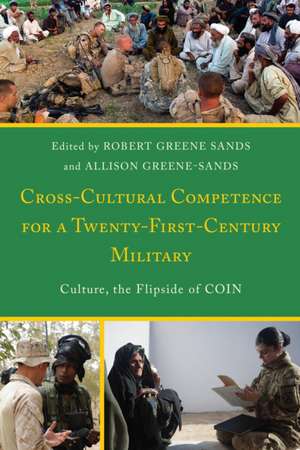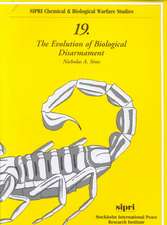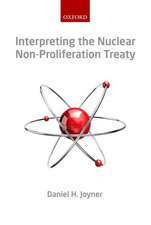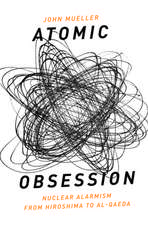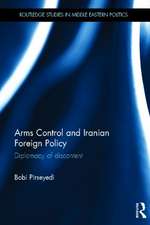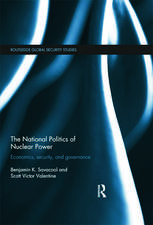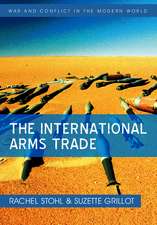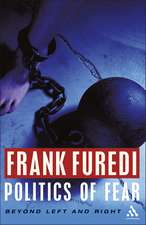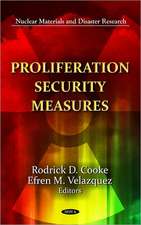Cross-Cultural Competence for a Twenty-First-Century Military
en Limba Engleză Paperback – 27 mar 2017
Cross-Cultural Competence for a Twenty-First-Century Military: Culture, the Flipside of COIN is a volume edited by two acknowledged experts on 3C in military learning, policy and research and explores the value and necessity of 3C to developing 21st Century warfighters. This volume features chapters by the editors and a host of multidisciplinary experts that probes all aspects of 3C, from concept to application. The message carried throughout Cross-Cultural Competence for a 21st Century Military is that contemporary and future security endeavors will be successful because winning wars ultimately rest on developing and sustaining cross-cultural relationships as much as it does on weapons and force.
Preț: 438.74 lei
Preț vechi: 569.79 lei
-23% Nou
Puncte Express: 658
Preț estimativ în valută:
83.95€ • 91.48$ • 70.74£
83.95€ • 91.48$ • 70.74£
Carte tipărită la comandă
Livrare economică 23 aprilie-07 mai
Preluare comenzi: 021 569.72.76
Specificații
ISBN-13: 9781498556293
ISBN-10: 1498556299
Pagini: 414
Dimensiuni: 152 x 229 x 30 mm
Greutate: 0.61 kg
Editura: Rowman & Littlefield
ISBN-10: 1498556299
Pagini: 414
Dimensiuni: 152 x 229 x 30 mm
Greutate: 0.61 kg
Editura: Rowman & Littlefield
Cuprins
LIST OF TABLES
LIST OF FIGURES
FOREWORD
Kerry Fosher
PREFACE
ACKNOWLEDGEMENTS
SECTION ONE
CONCEPTUALIZATION AND DEVELOPMENT
Section Introduction
Robert R. Greene Sands
Allison Greene-Sands
1: Why Cross-cultural Competence?
Robert R. Greene Sands
2: The Historical Development of Cross-cultural Competence
Allison Abbe
3: A Developmental Model for Cross-cultural Competence
Patrice Reid
Felicia Kaloydis
Mary Margaret Suddith
Allison Greene-Sands
4: Institutionalizing Cross-cultural Competence in
Department of Defense Policy
Allison Greene-Sands
SECTION TWO
THE OPERATIONAL ENVIRONMENT AND
CROSS-CULTURAL COMPETENCE
Section Introduction
Robert R. Greene Sands
Allison Greene-Sands
5: COIN and Beyond81
Robert R. Greene Sands
6: Cross-cultural Competence is Not Always Intuitive
Lieutenant Colonel Donald Snedeker (US Army, Retired)
7: Why Cross-cultural Competence is in the Tool Kit for
Foreign Area Officers
Colonel Humberto Rodriguez (US Army, Retired)
8: Cross-cultural Competence and Civil-Military Operations
Lieutenant Colonel Anthony Terlizzi (USMC, Retired)
SECTION THREE
RESEARCH TRENDS IN CROSS-CULTURAL COMPETENCE
Section Introduction
Allison Greene-Sands
Robert R. Greene Sands
9: Instrumentation Challenges in Developing Cross-cultural
Competence Models
Marinus van Driel
William K. Gabrenya
10: Developing Cross-cultural Competence Following Negative
Cross-Cultural Experiences
Jessica Gallus
Jennifer Klafehn
11: Complications in Cross-cultural Communications:
Using Interpreters
Aimee Vieira
12: Cross-cultural Influence and the Advising Mission:
Empirical Findings and the Way Ahead
Michelle Ramsden Zbylut
SECTION FOUR
EDUCATING AND TRAINING IN 3C
Section Introduction
Robert R. Greene Sands
Allison Greene-Sands
13: Cross-cultural Communication Contributions
to Professional Military Education:
A Distance Learning Case Study
Lauren Mackenzie
Megan Wallace
14: Cross-cultural Competence in the Classroom:
Measuring Instructional Effectiveness
Katie Gunther
15: Where¿s the ¿So What?¿:
Educating and training culture in the Marine Corps
Paula Holmes-Eber
16: Cross-cultural Competence plus Language:
Capturing the Essence of Intercultural Communication
Catherine Ingold
SECTION FIVE
CROSS-CULTURAL COMPETENCE AS ENABLER
Section Introduction
Allison Greene-Sands
Robert R. Greene Sands
17: Cross-Cultural Competence as a Critical Enabler for
Security Force Assistance Missions
Amy Alrich
18: Raumschach Negotiations
Colonel Stefan Eisen (USAF, Retired)
19: Diversity and Cross-cultural Competence
Kizzy Parks
Christoper Butts
Bianca Trejo
Daniel P. McDonald
INDEX
ABOUT THE CONTRIBUTORS
Notă biografică
Robert R. Greene Sands, PhD, is the director/senior research fellow at the Institute for the Study of Culture and Language at Norwich University and adjunct professor in Norwich University¿s Continuing and Graduate Studies program. Sands has extensive experience in the development of culture and regional expertise education and training programs for military and other organizations involved in stability operations.
Allison Greene-Sands, PhD, is the associate director for culture for the Defense Language and National Security Office, within the Office of the Under Secretary of Defense for Personnel and Readiness. She is currently leading the implementation of a new policy that will institutionalize ¿Cross-Cultural Competence (3C)¿ as a core component in training and education for all military and select Department of Defense civilian personnel.
Descriere
This book asserts that the application of cross-cultural competence to the unique environment of expeditionary deployment through military objectives is one of the most important force enablers in the U.S. international security mission. It will make an immediate and long-lasting contribution to Department of Defense research, learning, and policy.
